Strangest Presidential Campaign Advertisements
-
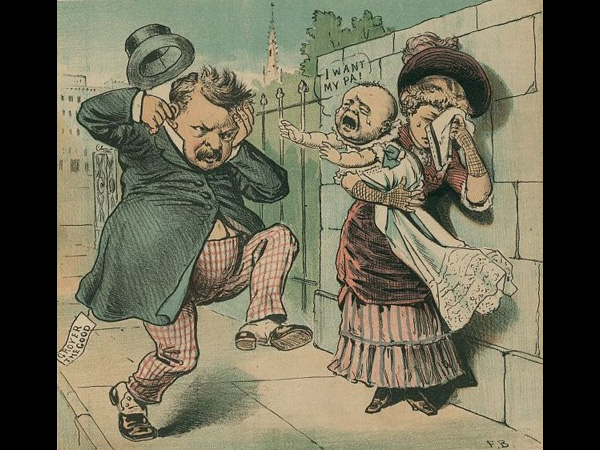 CREDIT: Image from Wikimedia Commons.
CREDIT: Image from Wikimedia Commons.1884: Republican James G. Blaine vs. Democrat Grover Cleveland
The late 19th century wasn't the most gripping period in the American presidency, but the 1884 contest stands out for its lengthy, rhyming slogans. Blaine dinged Cleveland for his alleged love child with "Ma, Ma, Where's my Pa?" Cleveland fired back over Blaine's unethical dealings with the railroad industry: "Blaine, Blaine, James G. Blaine, the continental liar from the State of Maine." Cleveland won the election, the first of his two nonconsecutive victories.
-
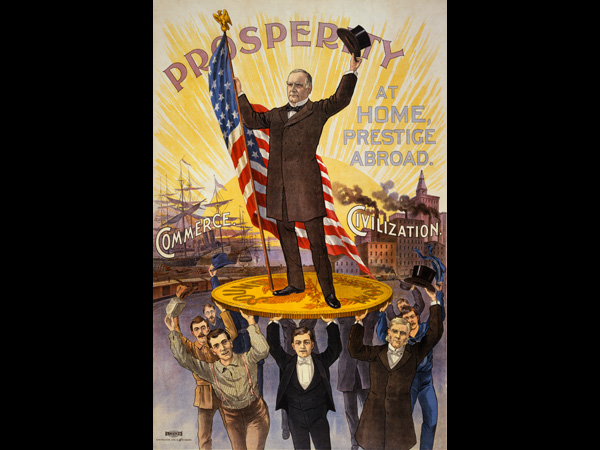 Photo courtesy Wikimedia Commons.
Photo courtesy Wikimedia Commons.1900: Republican William McKinley vs. Democrat William Jennings Bryan
Republican incumbent William McKinley was running for re-election after a successful first term in which he won a war against Spain, signed the Gold Standard Act, and presided over a period of prosperity. His rallying cry: "Four more years of the full dinner pail." It worked.
-
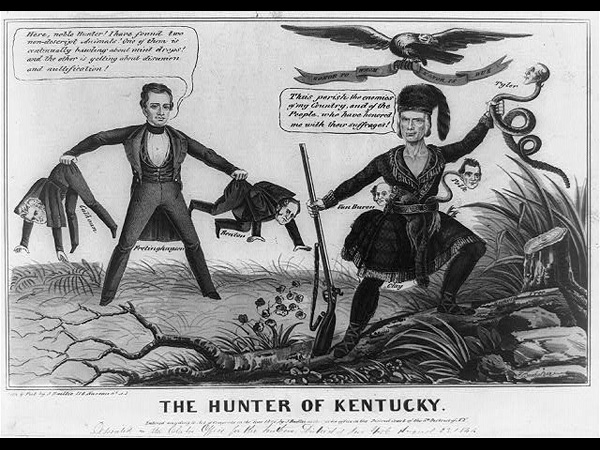 Photo courtesy Wikimedia Commons.
Photo courtesy Wikimedia Commons.1844: Democrat James Polk vs. Whig Henry Clay
Think Barack Hussein Obama was the first candidate with a complicated name? Henry Clay chose Theodore Frelinghuysen (pronounced FREE-ling-hy-zuhn) as his running mate. To inure Americans to this tongue twister, they ran on the slogan "Hurray! Hurray! The country is a-rising!/Hurray! Hurray! For Clay and Freylinghausen!'' They lost to James K. Polk and George M. Dallas.
-
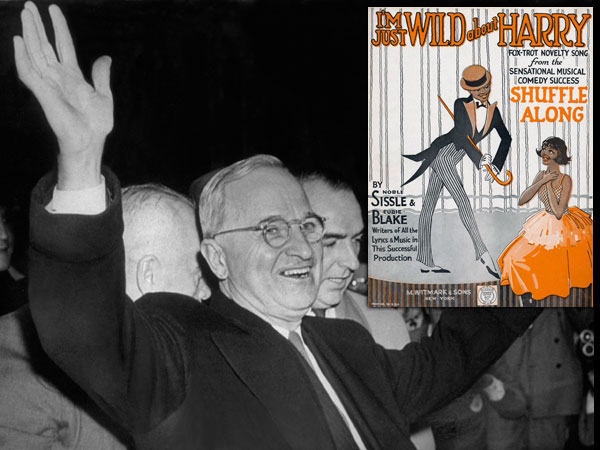 Photo by Keystone/Getty Images. Photo inset courtesy Wikimedia Commons.
Photo by Keystone/Getty Images. Photo inset courtesy Wikimedia Commons.1948: Democrat Harry S. Truman vs. Republican Thomas E. Dewey
Harry S. Truman borrowed the line "I'm just wild about Harry" from a 1921 song by Noble Sissle and Eubie Blake for the musical Shuffle Along (inset). At the time, it was written, the song was remarkable for its popularity in spite of being about love between two African-Americans. (Porgy and Bess wouldn't come along for another 14 years.)
Here, Truman greets a group of supporters in Kansas City after winning the election.
-
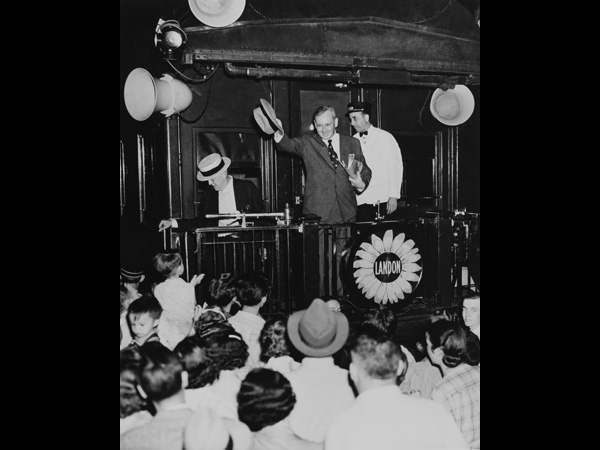 Photo by Keystone-France/Gamma-Keystone via Getty Images.
Photo by Keystone-France/Gamma-Keystone via Getty Images.1936: Republican Alf Landon vs. Democrat Franklin D. Roosevelt
Kansas Gov. Alf Landon ran against President Franklin Delano Roosevelt on an anti-New Deal platform under the slogan "Let's make it a Landon-Slide." He got half his wish: There was a landslide, just not for him.Here, Landon leaves a train station in Topeka, Kansas, in 1936.
-
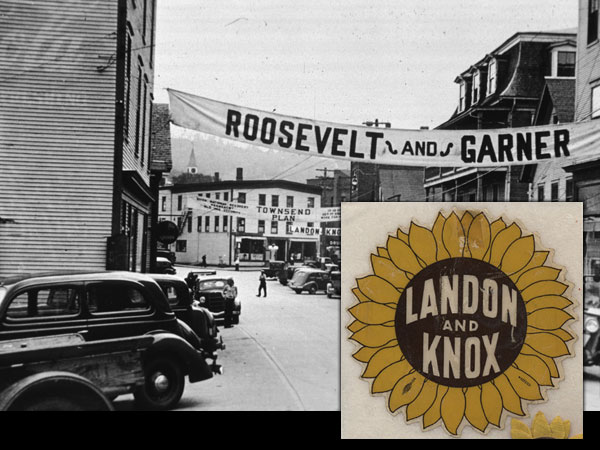 CREDIT: Photo by Carl Mydans/Library of Congress/Getty Images. Photo inset courtesy Cornell University Collection of Political Americana, Cornell University Library.
CREDIT: Photo by Carl Mydans/Library of Congress/Getty Images. Photo inset courtesy Cornell University Collection of Political Americana, Cornell University Library.1936: Republican Alf Landon vs. Democrat Franklin D. Roosevelt
Roosevelt's second of four presidential runs was against the governor of Kansas, whose campaign made prominent use of his state flower, the sunflower (inset). Roosevelt's ominous slogan: "Sunflowers die in November." Landon's campaign obliged.The banner pictured here hung in Hardwick, Vt. A competing sign for Landon is visible in the background.
-
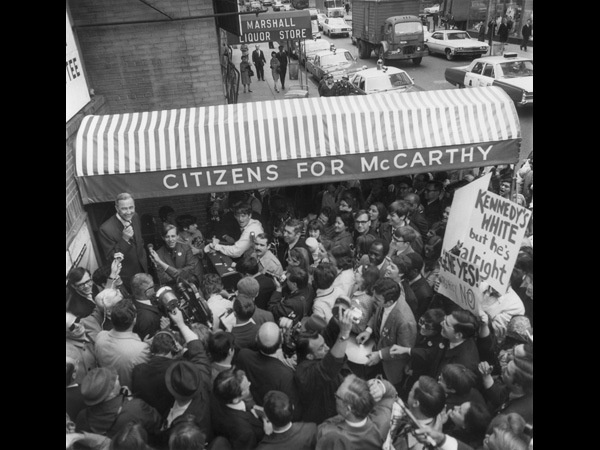 Photo by Hilde & William Tetlow/Getty Images.
Photo by Hilde & William Tetlow/Getty Images.1968 Democratic Primary: Eugene McCarthy vs. Lyndon Johnson
In the late 1960s, Eugene McCarthy, a U.S. senator from Minnesota, mobilized the youth vote in a campaign for the Democratic presidential nomination. His main message: End the Vietnam War. College students generally regarded for their long hair cut their locks, shaved, and slid on sleeker outfits to campaign door-to-door under the mantra "Go clean for Gene." McCarthy's narrow loss to sitting President Lyndon Johnson in the New Hampshire primary drove Johnson not to run for re-election. Robert F. Kennedy's entry into the race four days later largely sucked the oxygen out of McCarthy's run. (Hubert Humphrey would ultimately win the nomination after RFK's assassination.)
Here, McCarthy speaks to supporters in New York City outside his presidential campaign headquarters.
-
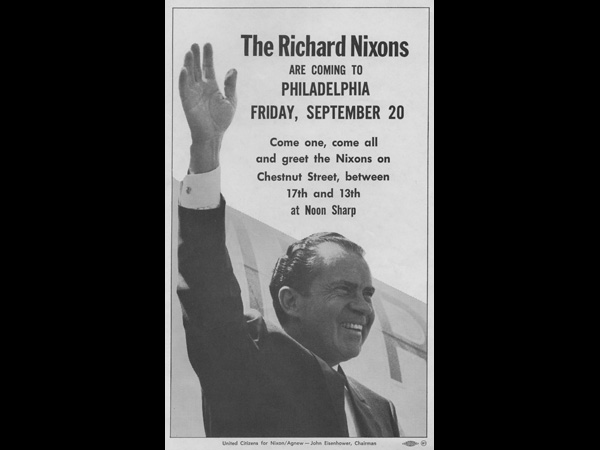 Advertisement from the Kean Collection/Getty Images.
Advertisement from the Kean Collection/Getty Images.1972: Republican Richard Nixon vs. Democrat George McGovern
George McGovern's supporters mocked Nixon's early association with Watergate with the slogan "Don't change Dicks in the middle of the screw! Vote for Nixon, '72!" (Several wartime presidents, including Lincoln and FDR, ran for re-election on a "don't change horses in mid-stream" message.) McGovern received 17 electoral votes to Nixon's 520.
-
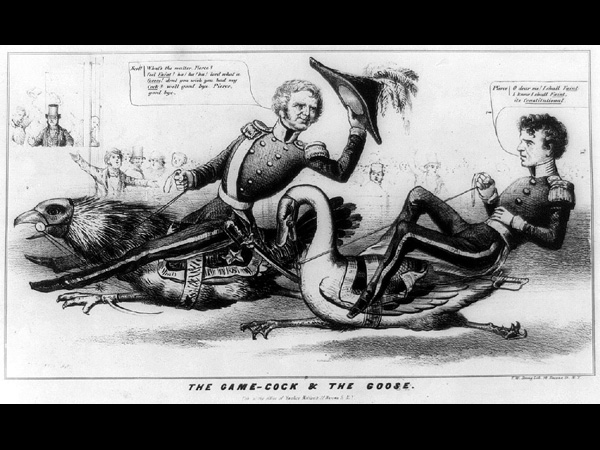 Photo courtesy Wikimedia Commons.
Photo courtesy Wikimedia Commons.1852: Democrat Franklin Pierce vs. Whig Winfield Scott
Pierce was the original "dark horse" candidate, who nonetheless ended up running on a "more of the same" platform based on the popularity of former President James K. Polk, who had stepped down for health reasons in 1849 and died shortly later. (Thank Polk—or blame him—for postage stamps and Texas.) Pierce, a former senator from New Hampshire known in Washington for excessive drinking and gossiping, promised a replay of Polk's first election: "We Polked you in 1844, we shall Pierce you in 1852." He did. -
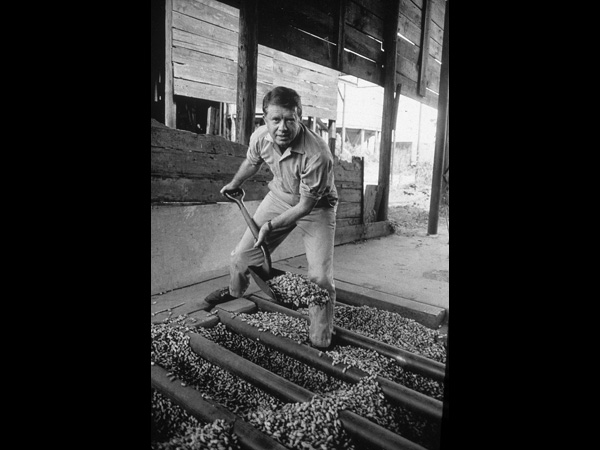 Photo from the Hulton Archive/Getty Images.
Photo from the Hulton Archive/Getty Images.1976: Republican Gerald Ford vs. Democrat Jimmy Carter
In a classic insider-vs.-outsider scrapple, former peanut farmer and Georgia Gov. Jimmy Carter capitalized on his political novice against the sitting president. Carter's slogan, "Not just peanuts," didn't fire up crowds in the more conventional "Yes, we can!" style. But it did cement the image of his humble roots with voters wearied by inflation, Vietnam, and Watergate. They gave him a chance for four years before moving on. Here, Carter shovels peanuts on the farm in Georgia.